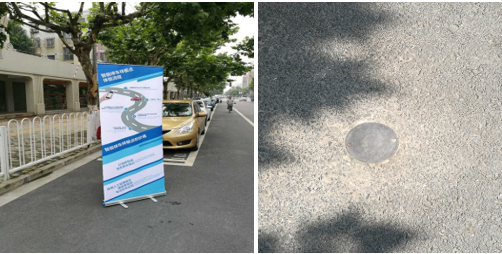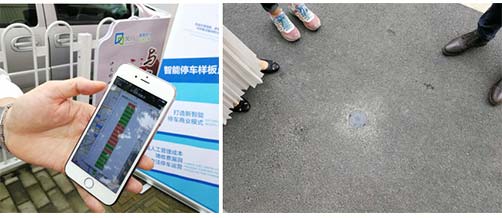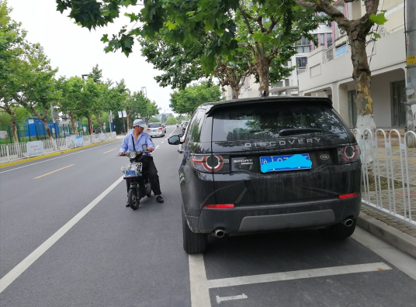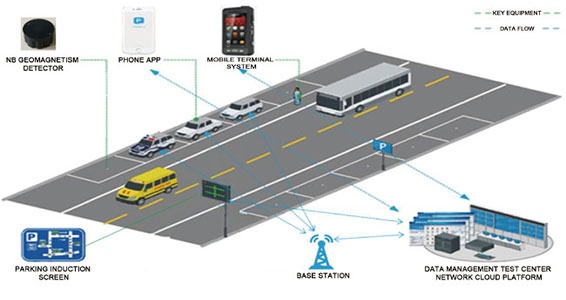Reporter detect personally NB-IoT wisdom parking: or breakthe "parking difficult" problem
SOURCE: COMMUNICATION WORLD All Media DATE: 2017/07/04
Communications world network news (CWW)since the beginning of this year, the narrowband Internet of Things NB-IoT industry is hot, intelligent parking, intelligent water service, sharing bicycles and other applications going to the pilot, becoming the focus of the government, operators, equipment manufacturers. But on the whole, NB-IoT is still in the preparation stage of the new technology show, not to mention the vast number of consumers, and even many industry people, have not personally experienced NB-IoT business.
How the experience of NB-IoT business going on earth? In the June 28 World Mobile Congress • during the holding of Shanghai, the communication world media reporter came to Shanghai Minhang District, a parking lot near the hospital roadside, personally witnessed NB-IoT intelligent parking business, investigated Shanghai Unicom, Huawei and CTFO, the three parties, how to solve the "parking difficult" problem.
Personally witness: very convenient, or becoming the model
As we all know, in order to seize the opportunity of the Internet of things, global operators have planned low-power wide area network (LPWAN) deployment. Because of its wide coverage, low power consumption, low cost, large-scale connection of the prominent features, NB-IoT was placed great expectation within the industry.
Of which, Shanghai Unicom is a positive forerunner. The intelligent parking solution deployed in Minhang District is a typical application of NB-IoT, with the purpose of new combination of "NB-IoT + Internet + Parking" to explore the big problem of solving urban parking.

Came to the pilot site, the reporter saw a spacious roadside with a very common row of parking spaces. But unlike the rest of the parking lot, each parking space on the ground with a bowl of large round objects, looking very "magic".

According to introduction from the staff on site, this is NB-IoT terminal equipment buried under the ground. Based on this, consumers can check the situation of each parking space through the WeChat (or parking APP) , looking for empty parking spaces, scheduled navigation, self-help payment. Reporters open the phone and concerned about CTFO public number, searching for the parking map, with the whole process of less than a minute. It seems that the drivers using NB-IoT smart car parking business, indeed being more convenient than before.
Imagine, in a beautiful weekend, you drove car with your family, was ready to the favorite restaurant, on the beauty of the big pleasure. But to the destination, it found that parking with"one spaces hard to find." Now "miracle" occurred: before starting off, open the phone APP, to look for empty parking spaces, scheduled navigation and with self-help payment.

Of course, the current business is still in the pilot stage, if the driver did not pay through APP, the staff would charge on site. It is reported that the business will also be introduced the Shanghai credit system to ensure that in the case of unattended operation with the normal operation of parking fees. In the future, with the NB-IoT intelligent parking business developed rapidly, the driver used to develop, will help CTFO to save a lot of manpower costs.
Landing: cooperation from the three parties, cross - border innovation
So how is the business done? It is reported that this is the smart parking solution jointly created by Shanghai Unicom, Huawei and CTFO three parties, relying on the technology innovation of the narrowband Internet of things + Internet.
In the specific technology, the program passed the "geomagnetic vehicle inspection + POS + cloud platform + APP" model, to achieve parking data collection, status monitoring, parking location, online payment, charge management, law enforcement and other intelligent functions.

Staff briefing, the project team lasted nearly half a year, having done the network monitoring, stability testing for the NB-IoT geomagnetic vehicle inspection device. For the most concerned in the industry about the NB-IoT terminal power consumption characteristics, which has been verified while parking. The current feedback data is estimated, a 19AH battery can run normally for 3 years.
Outlook: great value, containing business opportunities
At present, all parties believe NB-IoT owning a very bright future. To Shanghai smart parking project for example, with the Shanghai auto holdings continued to grow, in addition to road congestion, parking problems are increasingly prominent. According to statistics, nearly 30% of vehicles in Shanghai are looking for parking spaces every day, an additional 10% of the fuel consumption in the search for parking spaces in the process, causing the owner to spend nearly a hundred dollars per month on fuel consumption.
Different from a wide variety of garage parking technology, the road parking has alawys been very low degree of intelligence. The entrance control with a wide range of parking spaces, scattered and lack of fixing, leading to the vast majority of Internet of things technology scare off.
The lack of technology has brought a series of management issues:1. High cost of manual management and low efficiency: a car coordinator can only manage 10 to 15 parking spaces;2. parking fee with serious phenomenon of "deflation, water emitting, dropping and leakge" : lack of reliable regulatory mechanisms to ensure that parking fees are recorded in full; 3. Berth information island: parking status information cannot be achieved networking, with low parking turnover.
Parking management issues are more than those. The NB-IoT intelligent parking in addition to improving the owner experience, but also can solve the road parking management company's predicament. In particular: 1. Reduce the cost of manual management, improve efficiency: intelligent parking program is expected to reduce the on-site parking fees, th charging personal transformed to parking supervisior, guiding and cruising the smart parking; 2. Delicacy management: using the WeChat public and APP online payment, to avoid the phenomenon of "deflation, water emitting, dropping and leakge"; 3. Low cost, easy to install: the parking sensor is directly connected to the wireless base station, so there is no need to find a poles to install any repeater, gateway, without power supply and cabling; 4. Break the information island: to carrier-class high reliability to achieve parking data networking, paving the way for intelligent transportation.
Shanghai Unicom and CTFO said that the pilot project is currently in the trial operation period in Minhang District, to promote the parking friendly user experience and improve the process. In the second half, based on the stability of operational testing, the three parties will jointly strive to push the NB-IoT intelligent parking to the whloe city of Shanghai, and build Shanghai smart parking model.
Huawei as the technology and network services integrator of this joint pilot, the results of the intelligent parking program in the trial operation period exceeded the expectations. Huawei project leader said that from the view of connection points, the future of Internet of things market space in LPWA, will be more than 3 billion connection. The landing of the parking project also indicates that NB-IoT as one of the mainstream technologies of LPWA, to give the market a booster, will help the rapid development for wide-area and low-power application.

